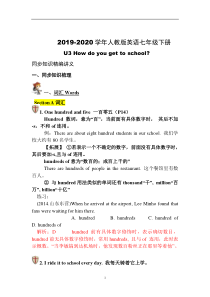 DOC
DOC
【文档说明】2019-2020学年人教版英语七年级下册Unit 3 同步知识精编讲义.doc,共(18)页,193.044 KB,由管理员店铺上传
转载请保留链接:https://www.doc5u.com/view-32423893575c554c8ce952514e416e3d.html
以下为本文档部分文字说明:
12019-2020学年人教版英语七年级下册U3Howdoyougettoschool?同步知识精编讲义一、同步知识梳理一、词汇WordsSectionA词汇1.Onehundredandfive一百零五(P1
4)Hundred数词,意为“百”,当前面有具体数字时,其后不加-s,不和of连用。例:Thereareabouteighthundredstudentsinourschool.我们学校大约有80名学生。【拓展】①若表示一个不确定的数字,前面没有具体数字时,其后要加-s,且与of
连用。hundredsof意为“数百的;成百上千的”Therearehundredsofpeopleintherestaurant.这个餐馆里有数百人。②与hundred用法类似的单词还有thousand“
千”,million“百万”,billion“十亿”练习:(2014.山东东营)Whenhearrivedattheairport,LeeMinhofoundthatfanswerewaitingforhimthere.A.hundredB.hu
ndredsC.hundredofD.hundredsof解析:Dhundred前有具体数字修饰时,表示确切数目,hundred前无具体数字修饰时,常用hundreds,且与of连用,此时表示概数。“当李敏镐到达机场时,他发现数百粉丝
正在那里等着他”。2.Irideittoschooleveryday.我每天骑着它上学。2①ride此处作及物动词,意为“骑”,后面可接bike,horse,motorbike.等例:Heridesabiketoschool.=Hegoestoschoolbybike
.他骑自行车去学校。②every形容词,意为“每一,每个”,其后接单数可数名词,everyday意为“每天”,是一般现在时的时间状语。例:Theyarebusyeveryday.他们每天都忙。Everystudentcomesh
ere.每一个学生都到这来了。【辨析】everyday与everydayeveryday表示某事发生的频率,意为“每天,天天”,在句中做状语;Wegotoschooleveryday.我们每天去上学。everyday形容词,意为“日常的,普通的”,在句中做定语;Istudyever
ydayEnglisheveryday.我每天学习日常英语。3.Doesyourdaddrivehiscartowork?你爸爸开他的车去上班吗?(P15)drive及物动词,意为“架势;开车送”。Drivehiscartowork相当于gotoworkbycar,所以本句还
可改写为:Doesyourdadgotoworkbycar?Herauntdrivesabus.她姑姑开公共汽车。Herbrotheroftendrivesher.她哥哥经常开车送她。【拓展】driver可数名词,意为“驾驶员,司机”4.
...livesaboutfivekilometersfromschool.……居住在距离学校大约5千米处。Live不及物动,意为“居住;生活”,其后若跟名词必须再名词前加适当的介词。若跟副词,则省略介词。例:Iliketolivein
thecountry.我喜欢住在农村。Wheredoeshelive?他住在哪里?【拓展】①liveonsth.意为“以某物为食”例:Sheepliveongrass.羊以草为食。3Theyliveonrice.他们以大米为生。②live
a...life意为“过...生活”例:Theoldmanlivesahappylife.这个老人过着幸福的生活。SectionB词汇1.busstop公共汽车站(P16)stop在此处做名词,意为“车站,站点”atthebusstop在公共汽车站
【辨析】busstop与busstationBusstop指城镇内外的临时停车点;busstation指能停靠、中专车辆的汽车总站点【拓展】stop也可做V.,意为“停止”,常用“stoptodosth.停下<正在做的事
情>来做某事<另外一件事>”;”stopdoingsth.停止做某事”例:Let’sstoptohavearest.让我们停下来休一下吧。Stoptalking,please!请停止说话。2.CrossingtheRiver
toSchool过河上学(P17)36cross此处作动词,意为“越过,穿过”,主要指“横穿”;还可作名词,意为“十字形,叉形记号”例:Thelittleboycan’tcrossthestreetbyhimself.这个小男孩不能独自坐马路。Theteachermarkedtheq
uestionwithacross.老师在这个问题上打了一个叉。【辨析】cross,across与crossingcross动词穿过Let’scrosstheroadnow.咱们现在过马路吧。across介词,副在…对面,穿Theylivejustacros
stheroad.他们就住在马路4词过面。crossing名词十字路口Turnleftatthefirstcrossing.在第一个十字路口左转。3.Thereisaverybigriverbetweentheirschoo
landthevillage.(P19)在他们的学校和村庄之间有一条很大的河。between作介词,意为“在…之间”。Between…and…意为“在…和…之间”,连接两个并列的成分。例:Thereisawindowbetwe
enwalls.墙之间有一个窗户。HesitsbetweenTomandJack.他坐在汤姆和杰克之间。【辨析】between与among▲between用于“两者之间”,表示双方之间的关系。只要构成双方关系,
不论对方的数目是多少,均用between。例:Rememberthisisasecretbetweenyouandme.记住这是你我之间的秘密。SwitzerlandliesbetweenFrance,Germany,AustriaandItaly.▲among用于指三个或三个以上的人
或物的“中间”,其宾语可以试复数名词或代词,也可是集合名词。例:amongallthepeople.在所有人中间。练习:(2013.天津)Theworkerswillbuildanewrailroadthetwocities
l.A.sinceB.betweenC.asD.during解析:B5Since“自从”;as”作为“;during”在…之间4.Butheisnotafraidbecausehelovesschool.但他并不害怕,因为他爱学校。(P1
7)Afraid形容词,意为“害怕的,畏惧的”,是一个表语形容词,其常见用法有:★beafraidofsth.意为“害怕某事/某物”例:Mostofthegirlsareafraidofsnakes.大多数女孩怕
蛇。★beafraidtodosth.“害怕做某事”例:Hereldersisterisafraidtostayathomealone.她姐姐害怕一个人待在家里。★beafraidofdoingsth.“害怕做某事”,指担心或担忧做某事会引起某种后果。例:Don’tb
eafraidofaskingforhelp.不要害怕求助。★beafraid+(that+)从句“恐怕”例:I’mafraid(that)hecan’tcome.我恐怕他不能来了。5.like在本课中作介词,意为“像”,常与look或be
连用。例:Itlookslikerain.看起来要下雨了。Sheisverylikehermother.她很像她的妈妈。【辨析】like与as▲like“像……一样”(实际上不是)例:Hetalkstomelikemyfather.他像父亲一样跟我讲话。(他
不是我父亲)▲as“作为,以……身份”(实际上就是)例:Hetalkstomeasafather.他以父亲的身份跟我讲话。(他是我父亲)6.true形容词,“真的,符合事实的”名词为truth“真相,6实情
”,在本课中和come连用,构成固定搭配cometrue意为“实现,成为现实”。例:Pleasebelieveme,thenewistrue.请相信我,这个消息是真的。Canyoutellmethetruth?你能
告诉我真相吗?Studyhard,andyourdreamwillcometrue.努力学习,你的梦想将会实现。练习:(2013.山东烟台)将句子补充完整。(每空一词)我相信我们的中国梦一定会实现。IbelieveourChinesedrea
mswill.解析:固定搭配cometrue二、重要句型ImportantSentencesstructures1.Shetakesthesubway.(P13)她乘地铁。★take+a/the+交通工具名词,表示乘坐某种交通工具;动词短语,在
句中做谓语takethebus/train/car/boat/plane.Johnusuallytakestheschoolbustoschool.约翰通常乘坐校车去上学。【拓展】take的其他含义:①“带走;拿走”,强调将某人或某物从说话地点带到其他地方去。例:Iwanttotakesome
bookstoschool.Hisfatheroftentakeshimtothebookshop.②“买下“例:Thesweaterisverynice.I’lltakeit.③与take相关的短语takeexercise
运动,锻炼takephotos照相,拍照takeaseat坐下,坐坐takeawalk散步takearest休息takedown取下takeaway拿走takeout拿出★by+表示交通工具的单数名词;on/in+限定词+表示交通
工具的名词,是介词短语,作方式状语,意为“乘(交通工具)”7例:Iwalktoschool.=Igettoschoolonfoot.我步行去学校。Iridemybiketoschool.=Igettoschool
bybike.=Igettoschoolonmybike.2.DoseJanewalktoschool?简步行去学校吗?walk在此做动词,意为“步行”,表示“步行去某地”可用短语walkto,后接表地点的名词、副词时,省略介词to.walkto…相当于getto…onfoot例:Thepark
isnearhere.Let’swalkthere.公园在这附近,我们步行去吧。Let’swalktoschool.=Let’sgotoschoolonfoot.3.Marywantstoknowwhathe
thinksofthetrip.玛丽想知道他认为这段旅程怎么样。★这是一个含有what引导的宾语从句的主从复合句,主句的主语是Mary,谓语是wantstoknow,宾语是一个特殊疑问句,原句应为“Whatdoeshethink
ofthetrip?”但在宾语从句中,从句的语序要用陈述语序,其中疑问词仍在句首,位置不变;另外,宾语从句的时态与主句的时态要一致。例:Iknowwhereyoulive.我知道你住在哪儿。Thomaswantstoknowhowshegetstoschool.托马斯想知道她怎样到
学校。★thinkof“认为,考虑“,of为介词,其后可接名词、代词或动词-ing形式作宾语,在表示”认为…怎么样”是,可与thinkabout互换。例:--Whatdoyouthinkof/abouttheschooltrip?你认为这次学校
郊游怎么样?--It’sgreat.【拓展】whatdoyouthinkof…?“你认为…怎么样?”可与“Howdoyoulike…?进行转换,用来询问某人对某事/某人的看法。例:Whatdoyouthinkofactionmov
ies?=Howdoyoulikeactionmovies?4.Formanystudents,itiseasytogettoschool.对许多学生来说,到达学校是容易的。★for是介词,在此意为“对…而言”8例
:Itisdifficultformetofinishmyhomework.对我来说完成作业很难。★Itis+adj.+todosth.“做某事是…”,其中it是形式主语,真正的主语是后面的动词不定时短语。例:I
tiseasytorideabike.Itisbettertostayathome.【拓展】①此句中的形容词若为描述事物特征的词,如difficult,easy,hard,important等时,其后的介词用for,构成“It’s+adj.+forsb.+todosth.”意为“做某事对某人
来说是…的”例:It’simportantforustoeatalotofvegetableseveryday.每天吃大量蔬菜对我们来说是很重要的。②此句型的形容词若为描述人物品质及性格特征的此,如clever,kind,good,nice等时,其后的介词用of,构成“It’s
+adj.+ofsb.+todosth.”例:It’sveryniceofyoutohelpme.你帮助我真是太好了。5.Ilovetoplaywithmyclassmates.我爱和我的同学们玩耍。▲lovetodosth.“喜爱做某事”例:Tomlovestoreadsto
rybooks.汤姆喜爱读故事书。【拓展】lovetodosth.表示一时的喜欢或暂时性的具体动作;lovedoingsth.表示一贯的喜欢,倾向于一种习惯。例:Iloveplayingcomputergames,butIlovetowatchTVn
ow.▲playwith“玩;与…玩“例:Heplayswithatoy.Don’tplaywithfire.6.Theyhavetocrossaverybigriverbetweentheirschoolandthevill
age.他们不得不穿越一条在他们学校和村庄之间的大河。haveto“必须,不得不”,强调外界客观因素要求主语不得不做某事,有人称和时态的变化,其后接动词原形。例:Bcausehehadnomoney,hehadtodropoutofschool.因为没钱,他不得不辍学了
。9【辨析】haveto与musthaveto必须;不得不表示客观的需要,有人称,数,时态的变化don’t/doesn’thaveto表示“不必”Youdon’thavetotellhimaboutit.你没必要把这件事告诉他。must必
须;一定表示说话人主观上的看法,无时态变化mustn’t表示“禁止”Youmustn’ttellhimaboutit.你一定不要把这事告诉他。练习:用must,haveto,musn’t,don’thaveto
填空1、Youtalkinthelibrary.2、Mymotherisill,Igohomenow.3、Weprotectourenviornment.解析:1.mustn’t2.haveto3.must7.Thanksforyourlaste-mail.谢谢你
的上一封电子邮件。Thanksfor...意为“谢谢你...”,相当于thankyoufor...,其后常接名词或v-ing形式,表示感谢的内容或原因例:Thanksforyourhelp.=Thanksforhelpingme.谢谢你的帮助。Thanksforinvitingme.
=Thanksforyourinvitation.谢谢你的邀请。练习:(2014.四川泸州)Thanksformewithmyscience.A.helpB.tohelpC.helpingD.yourhelp解析:Cthan
ksfor+名词/thanksfordoing.三、语法专项GrammarFocushow引导的特殊疑问句【教材原句】:1.–HowdoesMarygettoschool?玛丽怎样到学校?10--Shetakesthesubway.2.–Howlongd
oesittakeyoutogettoschool?你到学校要用多少时间?--About15minutesbybike.骑自行车大约15分钟。3.–Howfarisitfromhere?它离这里有多远?--It’sfivekilom
eters.5千米以上三段对话中,how提问交通方式;howlong提问时间的长短,即时间段;howfar提问距离。【语法全解】1、how引导的特殊疑问句提问交通方式。其答语分三种情况:①takea/the+表示交通工具的名词;②by+表示
交通工具的名词;③on/in+限定词+表示交通工具的名词;--Howdoyougotoworkeveryday?你每天怎样去上班?--Itakethesubwaytowork./Igotoworkbysubway./Igotoworkinthes
ubway.另外,how引导的特殊疑问句,也可用于询问方式、程度、天气等。用法例句询问方式、手段--HowdoyouusuallystudyEnglish?--Bydoingmorereading,writingandprac
ticing.询问程度--HowdoyoulikeWuhan?--Ilikeitverymuch.询问天气--How’stheweathertoday?--It’scloudy.询问健康状况Howisyourgrandfather
?“How+形容词/副词”询问年龄、身高、数量、次数Howoldareyou?Howmanyapplesdoyouhave?2、howlong用来提问时间的长短,意为“多长时间--Howlongdoesittakeyoutofinishyourhome
work?--Ittakesmeanhourtofinishmyhomework?【拓展】howlong还可以用来提问物体的长度,意为“多长”11--Howlongistheriver?这条河多长?--It’sabout6600kilometers.大约6600
千米长。练习:(江苏南京中考)--doyouwatchTVeveryweek?--Lessthantwohours,Ioftenhavemuchhomeworktodo.A.HowmanyB.HowmuchC.HowlongD.Howoften解析:C3、
howfar用来提问距离,意为“多远”,其答语分为两种情况:(1)用长度单位表示--Howfarisitfromyourhometothebusstop?从你家到公交站有多远?--It’sfivekilometers.5千米远。(2
)用时间表示--Howfaristheparkfromthesupermarket?从超市到公园有多远?--It’stenminutes’walk.步行10分钟的路程。练习:(四川遂宁中考)--isitfromyourhometothebussta
tion?--It’sabout5kilometers.YoushouldtakeNo.3bus.A.HowoftenB.HowlongC.Howfar解析:C12语法专练:1、--doesyourmothergotoworke
veryday?--Bybike.A.WhyB.WhereC.HowD.What2、--doesittakeyoutodoyourhomeworkeveryday?--Aboutanhour.A.HowfarB.HowmuchC.HowmanyD.Howlong3、--isitfromtheho
teltothezoo?--It’stenminutes’ride.A.HowB.HowlongC.HowfarD.Howmany4、--areyourshoes?--They’retwohundredyuan.A.Howmu
chB.HowmanyC.HowlongD.Howfar5、--picturesarethereonthewall?A.HowB.HowmanyC.HowmuchD.Howlong(建议10分钟,挑选部分题目课上训练,其
余13留作家庭作业)Ⅰ.单项填空1.—doyoulikeyournewbike?—It’scool.A.HowB.WhatC.WhereD.Why2.—OurclasswinstheEnglishspeakingcontest.—Congratulations!Youbeverypr
oudofit.A.canB.needC.wouldD.must3.Heusuallygoestoschoolbike,butsometimeshegoestoschoolfoot.A.with;on
B.on;byC.on;withD.by;on4.Itthemabouthalfanhourtogettoschooleveryday.A.spendsB.costsC.paysD.takes5.—Howdoyougotothepark?—Imybikethere.A.driveB.rideC.
getD.stand6.—Ihavetogettotheairportat10:00butit’s9:40now.—!Icansendyoutherebycar.A.ThankyouB.HurryupC.Don’t
worryD.Tryyourbest7.Whenitrains,Iataxitothepostoffice.A.makeB.takeC.bringD.want8.—isitfromyourhometothebank?—Threemiles.A.HowfarB.HowmuchC.Hows
oonD.Howlong9.—Howfarisyourteacher’shomefromhere?—It’sabouttwodrive.A.hour’sB.hoursC.hours’D.hour10.HowdoessheShanghai?A.reachesB.arrive
atC.gettoD.getsⅡ.完形填空(每小题1.5分,满分15分)Tom11nearthesea.Theirhouseisnotveryhigh,butitisbeautiful.There12bigtreesandasmallgardeninfron
t13theirhouse.Theyplantflowersinthegarden.Somearered,somearewhite1414someareblue.Tomandhisfamilylove15gardenverymuch.16Tomandh
issistergotoschool17bus.Thebusiscomfortable.Thereareairconditionersinthebus.Anditisadouble-deckerbus.Af
terschool,theysometimeshelptheirmum18someshoppingattheShoppingCentre,andsometimeshelptheirdadinthegarden.Atweekends,theyoftentakesomephotosbythes
ea.19summer,theyoftengoswimming20theirparents.11.A.livesB.livedC.livingD.liveing12.A.areB.isC.wasD.be13.A.toB.
forC.atD.of14.A.butB.orC.atD.and15.A.theyB.themC.theirD.theirs16.A.AllB.BothC.SomeD.Two17.A.onB.byC.takeD.sit18.A.doB.doingC.doe
sD.did19.A.InB.OnC.AtD.To20.A.andB.forC.ofD.withⅢ.阅读理解(每小题2分,满分20分)IfyougotoHongKongbyair,youwillarriveatHongKongInternationalAirport.Becauset
herewasnotenoughland,thiswasbuilt(被建造)outintothesea.ItisinthepartofHongKongcalledKowloon.KowloonisoneofthetwobigcitiesinHon
gKong.TheothercityisHongKongitself.Itisonanisland.Youcangettherebyshiporthroughatunnel(隧道)underthesea.MuchofHongKongisfarmlandandmountains.T
hepopulationofHongKongisoversixmillion.ChineseandEnglisharespokenbymanypeople.Clothes,computers,radiosandTVsaremadein
HongKong.Youcanbuyallkindsofthings,suchaswatchesandcomputersthere.PeoplefromallovertheworldtraveltoHongKongeveryyear.Y
oucanwatchdogracingormotorracing.Someplacesarequietandbeautiful.Whenyouarehotandtired,therearesmallcoolgardenstorestin.Therearealsoal
otofhotelstolivein.HongKongisalsoagood15placeforwonderfulChinesefood.Youcanenjoymanykindsoffood,forexample,fish,vegetablesand
thefamousBeijingDuck.ThereiscertainlyalottoseeandtodoinHongKong.21.Theairportwasbuiltoutintotheseabecause.A.itisneartheseaB.ther
ewasnotenoughlandC.planesarrivesafelyD.itwouldbegood22.Kowloonis.A.thenameofacountryB.thenameofanairportC.oneofthetwobigcitie
sinHongKongD.abigcityunderthesea23.MostpeopleinHongKongspeak.A.neitherChinesenorEnglishB.ChineseonlyC.EnglishonlyD.Chin
eseandEnglish24.TherearetravelersinHongKongeveryyear.A.alotofB.fewC.severalD.some25.Themainidea(大意)ofthefourthparagraph
is“”.A.DogracingisinterestingB.BeijingDuckisfamousC.ChinesefoodisfamousD.HongKongisagoodplacefortravelingⅣ.根据句意及首字母
提示完成单词(每小题1分,满分5分)26.Myyoungersisterusuallywalkstowork,butsometimesshegoestoworkbys.27.InmostpartsofChina,studentsrbikestoschoo
l.28.LiuMing’shomeisabout12kfromschool.29.Hisbigdistobeaprofessional(职业的)writer.30.Fiftyandfiftyisoneh.Ⅴ.用括号里所给单词的适当形式填空(每小题1分,满分5分)31.Thankyo
ufor(tell)methegoodnews.32.Howlongdoesittakeyou(walk)totherailwaystation?1633.Don’t(worried)aboutyou
rEnglish.Wecanhelpyou.34.Hefeelsverytired(疲劳的);hewantstostop(have)arest.35.Itisverydifficultforthesechildren(cross)theriver.Ⅵ.句型
转换(每小题1分,满分5分)36.Mr.KingoftenfliestoSydneyforthemeeting.(同义句转换)Mr.KingoftentoSydneyforthemeeting.37.Whatd
oyouthinkofthefilm?(同义句转换)doyouthefilm?38.Hisfactoryis5milesfromhishome.(就画线部分提问)ishisfactoryhishome?39.Mymotherusuallytakesthebustowork.(改为否定句)My
motherthebustowork.40.Iusuallyspendthreehoursdoingmyhomework.(同义句转换)Itusuallymethreehoursmyhomework.17参考答案Ⅰ.1.AHowdoyoulike
...?“你认为……怎么样?”,与答语一致。2.Dmust表推测,答语“祝贺你!你一定为此感到自豪”与上句意义相一致。3.Dbybike,onfoot均为固定短语。4.Dtake意为“花费”,常用it作形式主语,构成“Ittakessb.sometimetodosth.”句型。5.Br
ide意为“骑(自行车)”。6.C由“我可以用车送你到那里”可推知应选C项,意为“别担心”。7.Btakeataxi乘出租车。8.Ahowfar“多远”,提问距离。9.C本题考查名词所有格的用法。前面有数词two,故hour先变为复数形式后,再变为名词所有格形式,two
hours’drive意为“开车两小时的路程”,故选C。10.CA、D两项形式不正确;B项介词at应为in;C项getto意为“到达”,是正确的表达。Ⅱ.11.A整篇文章用一般现在时,故选lives。12.A本句为th
erebe句型,be后名词是复数名词trees,故用are。13.Dinfrontof“在……前面”。14.D前后两个分句为并列关系,故选and。15.Cgarden为名词,其前要用形容词性物主代词修饰。16.Bboth...and...“……和
……都”。17.B“乘公共汽车”用bybus。18.Ahelpsb.dosth.“帮助某人做某事”。19.A一年四季前用介词in。20.Dwith“和……一起”。Ⅲ.21.B由第一段的Becausethere
wasnotenoughland,thiswasbuilt(被建造)outintothesea.“因为没有足够的陆地,因此飞机场被建在海里”可知答案为B。22.C由第一段的Kowloonisoneofthetwob
igcitiesinHongKong.“九龙在香港是两个大城市之一”可知答案为C。23.D由第三段的ChineseandEnglisharespokenbymanypeople.“许多人说汉语和英语”可知答案为D。24.A由第四段第一句“世界各地的人们每年
来香港旅游”推知,每年香港有很多18旅游者。25.D第四段的大意为“香港是一个旅游的好地方”。Ⅳ.26.subwaybysubway乘地铁。27.rideridebikes骑自行车。28.kilometerskilometer千米,公里。
29.dreamdream梦想。30.hundredhundred百。Ⅴ.31.tellingthanksb.fordoingsth.是固定搭配,意为“感谢某人做某事”。32.towalk“Ittakes/tooksb.+一段时
间+todosth.”是固定句型,意为“某人花费多长时间做某事”。33.worrydon’t后接动词原形。worry是形容词worried的动词原形。34.tohavestoptodosth.意为“停下来去做某事;开始做某事”。35.tocross“It’s+形容词+forsb.
todosth.”是固定句型。Ⅵ.36.takestheplane“flyto+地点”意为“飞往某地”,相当于“goto+地点+byplane”或者“taketheplaneto+地点”。37.How;likeWhatdoyouthinkof...?意为“你认为…
…怎么样?”,相当于“Howdoyoulike...?”38.Howfar;from对两地之间的距离提问用howfar。39.doesn’tusuallytakeusually用于助动词之后。40.ta
kes;todo